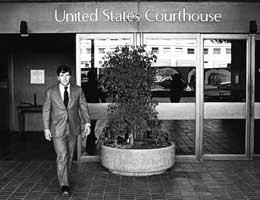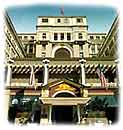
| Home | Mike's Bio | The Issues | Endorsements | Help Elect Mike |
| Mike in the News | Mike's Cases | Contact Us | Election Info | Register to Vote |
|
Selected
Cases of Mike Aguirre
Mike Aguirre is rightfully proud of many of the cases he has prosecuted, both for the government and with his own firm. Here are some of the cases, selected by Mike himself, that he thinks best represent his work. As you read about these cases, ask yourself: is this the kind of work I would want the County District Attorney to take on? If the answer is yes, Mike is your logical choice. |
 |
|
| Dene
Armstrong and Local 89 (1975-1976)
The primary defendant retired at age 34 with 77 years pension credits. Mr. Aguirre directed a year long special federal grand jury investigation into the matter. The Department of Labor deployed special agents from Washington D.C. to work on the matter along with San Diego office of the FBI. Assistant United States Attorney Tom Coffin presented the case in Court. Mr. Aguirre uncovered the wrongdoing based upon a walk-in complaint he took at the United States Attorney's Office. New
York Organized Crime
This case occurred back in the days in which important elements of the Teamsters Union was controlled by organized crime figures. This is no longer the case. Mr. Aguirre conducted the investigation in Detroit, New York City and Miami Florida. Mr. Aguirre presented the Report and finding to the Senate Committee. The investigation took place around the time Mr. Hoffa disappeared. La Costa Libel Trial
Mr. Aguirre was hired by the lead counsel in the case, Paul, Hastings Janofsky and Walker to work on the "truth" defense. This required the investigation and presentation of evidence to show the factual allegations of the article was true. Mr. Aguirre is credited with playing a key role in uncovering evidence that was instrumental in winning the case. McKee Construction Case In the early 1980s, Mr. Aguirre prosecuted a real estate fraud case against a prominent attorney in San Diego. Mr. Aguirre represented an investor who had entrusted several hundred thousand dollars to the construction company based upon the attorney's assurances. Mr. Aguirre was able to trace funds through banking accounts, showing the attorney had received a substantial cashiers check at about the time of the investor parted with his money. This turned out to be a finders fee. The
attorney was represented by a major New York law firm that happened
to have a San Diego office. The case was tried before Judge Alpha Montgomery.
Mr. Aguirre's client was successful and recovered his losses with interest.
Mckee was successfully prosecuted, as a result of Mr. Aguirre's work
by the San Diego District Attorney. It was during this time Common Sense Capital A tape recording found in this real estate limited partnership fraud caught one of the perpetrators bragging how he specialized in taking money from widows. There was nothing sensible about the Common Sense Capital companies who raised millions of dollars, mostly from elderly investors in San Diego. The funds were supposed to be used to buy real estate at good prices. Unfortunately, the money was diverted and wasted. Mr. Aguirre brought a series of class action fraud cases that resulted in the investors recovering their losses. Two individuals were also criminally prosecuted, one an attorney, again based upon the work of the Aguirre office. American Principals Holding Sadly San Diego has experienced one investment fraud after the next and the early and mid-1980s saw a continuation of this pattern. The American Principals fraud resulted in the losses of tens of millions of dollars. It demonstrated that fraud artists, like drug smugglers, get better at their trade with the passage of time. This case resulted in a series of actions filed against the accountants and attorneys who assisted in perpetuating the "Ponzi Scheme" underling the APHI fraud. Ponzi was a fraud artist in Boston who operated his scheme by using money from new investors to pay earlier investors. So long as new money comes in, the scheme continues. Ponzi was eventually found out - as are all those who have come behind him. The APHI case settled without the need to go to trial and the investors recovered substantial portions of their losses. US Grant Hotel and Prudential Bache Securities The success of local fraud artists in raising millions of dollars from trusting investors proved too much for one of Wall Street's major investment brokers, Prudential Bache Securities. Operating out of its Direct Investment Group, the firm helped to raise billions of dollars for questionable real estate projects across the country. The usual scenario was to overstate the value of the real estate, overstate the expected cash flows, and then use these inflated numbers to hoodwink investors into buying limited partnerships supported by the pie in the sky numbers.
|
Public Service Company of New Mexico
Public Service Company of New Mexico, or PNM, was one the more aggressive utilities to play this game. They decided to pour hundreds of millions of dollars into real estate developments and promptly lost their shirts. PNM was tardy in reporting its losses and investors ended up buying their stock just before it tanked. Mr. Aguirre originally filed the case in Albuquerque, where scores of other related cases were pending. New Mexico had relatively little experience with cases of this magnitude and eventually the entire group of cases were transferred to San Diego for settlement. The parties were able to work out a substantial settlement, but the losses were so great that investors only recovered cents on the dollar. City of San Diego Redistricting
In the late 1980s, Aguirre & Meyer filed a series of legal challenges to the City of San Diego's system. San Diego had been singled out as one of the citys that was vulnerable to such an attack in a U.S. Senate Report. While their action was pending, voters approved a district election system. However, for the minority communities the war was still not won. A second lawsuit was filed, challenging the boundaries that had been drawn by the council. Under the council plan, African-American and Latino voters were divided into several districts to weaken their ability to elect candidates of choice. With the support of the San Diego Union, Mayor Maureen O'Connor and wide variety of community groups, they again filed suit. This time they were successful in causing the district boundaries to be fairly drawn. They were also able to advance a plan to have an independent redistricting commission draw district boundaries after the census is taken in future decades. PCB's and Convair Lagoon Several environmental groups suspected that something was wrong at Convair Lagoon, which is located on the bayside near the Lindbergh Field. They suspected that companies in the area were discharging hazardous waste into the Lagoon and bay, and they were right. A significant amount of PCBs, a dangerous hazardous waste product, were found in the Lagoon. Aguirre & Meyer conducted an investigation and determined that a local major manufacturer was at fault. A lawsuit was brought against the company. This led to several years of negotiation and litigation. Finally, a clean up plan was approved and implemented. The lagoon was dredged, the PCBs removed and relocated to an approved hazardous waste site. Weintraub Entertainment Group and Bear Stearns
Jerry Weintraub was a famous Hollywood producer. He had been named Producer of the Year in 1986 by the theater owners organization. He had been hired as the CEO of United Artists, but had abruptly departed. In the months following, he approached Bear Stearns to provide the financing to start his own production company, WEG. He met a young investment banker who had stars in his eyes. They decided to raise more than $80 million from wealthy investors and major institutions. The key point made to investors was that Mr. Weintraub would have enough money to make 17 movies, and the law of averages would result in enough successes for the firm to make money. The only problem was that the financing to make the 17 movies was not in place. After the first several movies flopped, the money was gone and firm was in bankruptcy. This case lasted almost 9 years. It was dismissed and then reinstated by the appellate courts. However, after a six week trial, it took the jury just a few hours to reach a unanimous verdict in favor of the investors. The jury found Bear Stearns had committed a violation of the antifraud provisions of the federal securities laws. First Pension and Price Waterhouse Coopers The largest accounting firm in the world aligned with one of most aggressive law firms in New York City spells major trouble for firms of the size of Aguirre & Meyer. The tactic used is to spend so much money on the litigation that you simply run your opponents out of the case. The underlying facts are straightforward. First, Pension held itself out to investors as a pension administrator and investment advisor. The firm's specialty was to manage IRA's, 401ks, and other pension funds. The only problem was that once the money came in it went right out the back door to pay for the expense of one of California's largest Ponzi schemes. The three principals went to federal prison. The accounting firm of Coopers and Lybrand performed scores of accounting services for the various firms involved in the fraud, but never disclosed any wrongdoing to investors or regulators. The trial in this case lasted over four months. The jury took 9 days to decide the case. To the great joy of investors, the jury returned a special verdict, answering yes to all 55 questions on the special jury verdict form. The investors were able to recover their losses, with interest. Companies Manipulating The California Electricity Markets Aguirre & Meyer is currently prosecuting cases on behalf of rate payers against several multinational corporations suspected of manipulating California's electricity markets and causing California consumers billions of dollars of losses. |
| Home | Mike's Bio | The Issues | Endorsements | Help Elect Mike |
| Mike in the News | Mike's Cases | Contact Us | Election Info | Register to Vote |
|
Paid for by Mike Aguirre for District Attorney
#1238684 |





 For
decades the San Diego City Council election system was literally rigged
to make it impossible for strong candidates who wanted to represent
the less fortunate areas of San Diego to win office. With "at large"
elections, the same city-wide majority elected all members to the council.
For
decades the San Diego City Council election system was literally rigged
to make it impossible for strong candidates who wanted to represent
the less fortunate areas of San Diego to win office. With "at large"
elections, the same city-wide majority elected all members to the council. Every
attorney knows of at least one case in the office that presents the
threat of destruction, and for Aguirre & Meyer the WEG case was
it.
Every
attorney knows of at least one case in the office that presents the
threat of destruction, and for Aguirre & Meyer the WEG case was
it.